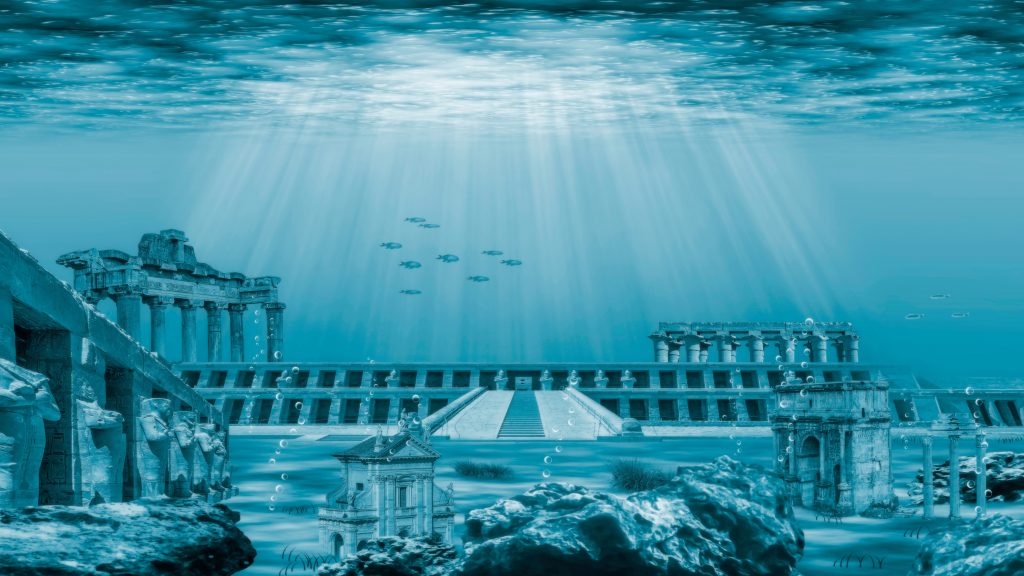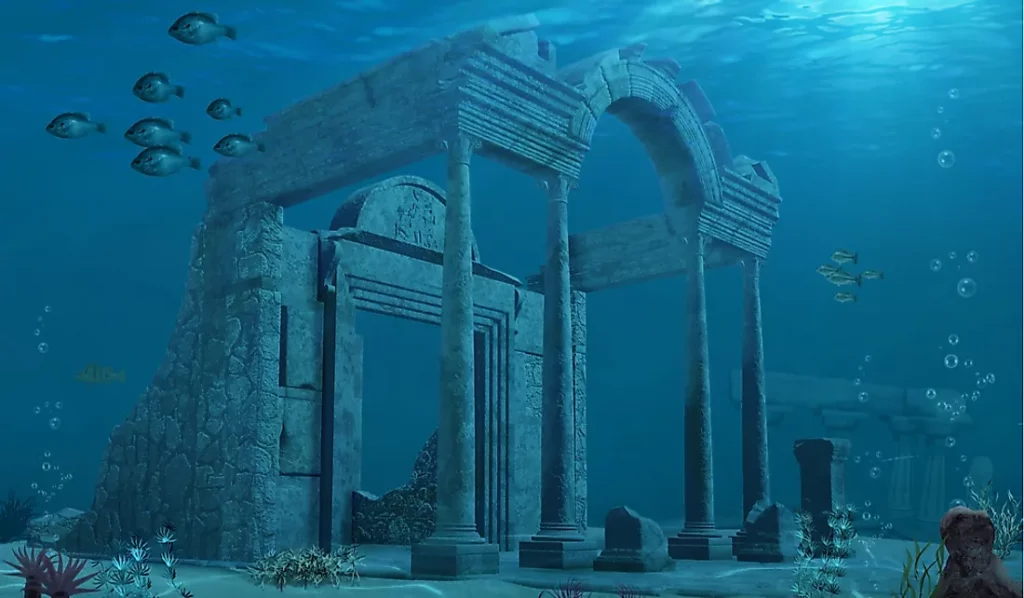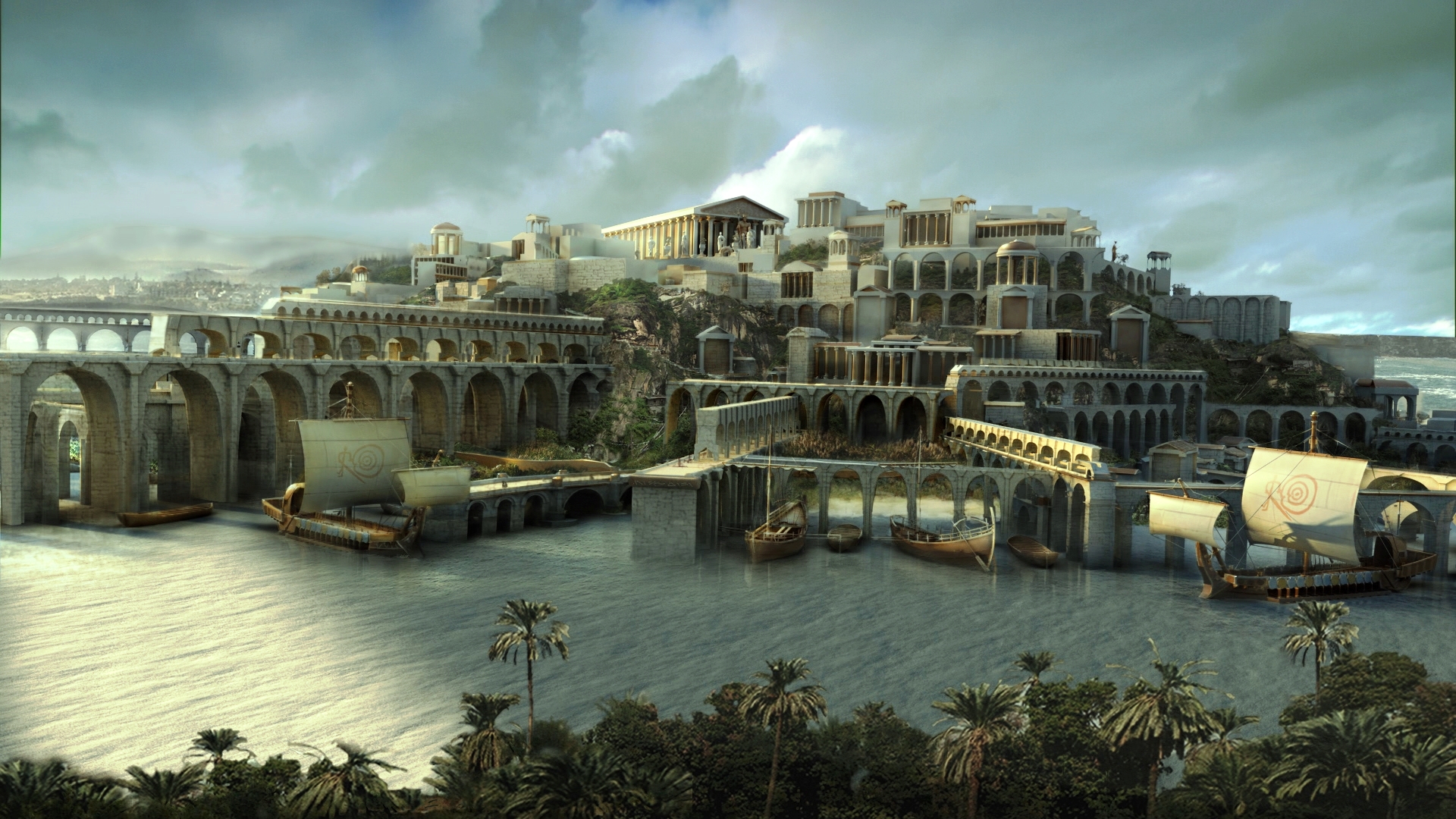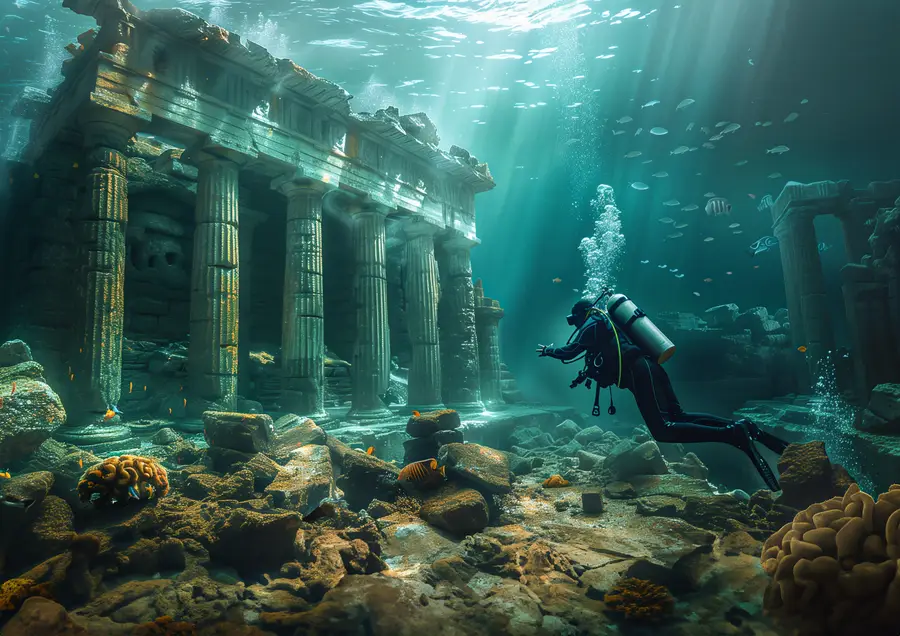The myth of Atlantis has captivated the imaginations of people for millennia. A tale of a powerful and advanced civilization that met a tragic end, Atlantis is often depicted as a utopia that vanished into the depths of the sea. The allure of this lost city lies in its blend of historical intrigue, philosophical musings, and the tantalizing possibility of discovering a hidden chapter of human history.
The origins of the Atlantis myth can be traced back to the ancient Greek philosopher Plato. In his dialogues “Timaeus” and “Critias,” written around 360 BCE, Plato presents Atlantis as an immense and formidable island nation that existed about 9,000 years before his time. Through the character of Critias, Plato describes a civilization that, despite its initial virtue and prosperity, ultimately fell into moral and physical decay, leading to its catastrophic downfall. While Plato’s purpose in recounting the story remains a topic of scholarly debate, his depiction of Atlantis continues to inspire speculation, exploration, and artistic creation.
The Origins of Atlantis

Plato’s dialogues “Timaeus” and “Critias” are the primary sources of the myth of Atlantis. Written in the fourth century BCE, these works present the story of Atlantis through a philosophical and allegorical lens.
Plato’s “Timaeus” and “Critias”
In “Timaeus,” the dialogue begins with a discussion on the nature of the universe and humanity’s place within it. The narrative sets the stage for the story of Atlantis, with Critias recounting an ancient tale that was passed down through generations. Critias claims that his grandfather learned the story from Solon, the famous Athenian lawmaker, who heard it during his travels in Egypt.
“Critias” continues the story, providing a detailed account of the island of Atlantis, its people, and its eventual downfall. According to Critias, Atlantis was a vast island located beyond the “Pillars of Hercules” (known today as the Strait of Gibraltar). The Atlanteans were a powerful and technologically advanced civilization, characterized by their immense wealth, sophisticated architecture, and strong military.
Description of the Dialogues
In “Timaeus,” the story of Atlantis is introduced as part of a broader conversation about the origins and nature of the universe. The dialogue begins with Socrates, Timaeus, Critias, and Hermocrates discussing the ideal state and the creation of the cosmos. Critias then shares the tale of Atlantis, setting the scene for a more detailed exploration in the subsequent dialogue, “Critias.”
“Critias” delves into the specifics of the Atlantean civilization. Plato describes a society that was initially virtuous and prosperous, ruled by wise and just leaders. The island itself was a marvel of engineering, with a complex system of canals, impressive temples, and luxurious palaces. However, over time, the Atlanteans became increasingly corrupt and ambitious, ultimately leading to their downfall. According to the story, the gods punished Atlantis by causing a series of natural disasters, which resulted in the island sinking into the sea.
Plato’s Purpose in Mentioning Atlantis
Plato’s purpose in mentioning Atlantis has been the subject of much scholarly debate. Some scholars argue that Plato intended the story as a philosophical allegory, illustrating the dangers of hubris, greed, and moral decay. In this interpretation, Atlantis serves as a cautionary tale, warning against the perils of a society that loses its virtue and succumbs to corruption.
Others believe that Plato’s account of Atlantis may have been inspired by real historical events or civilizations. Some suggest that the story could be based on memories of ancient cultures or natural disasters, such as the eruption of the Thera volcano, which devastated the Minoan civilization on Crete.
Regardless of Plato’s true intentions, the myth of Atlantis has endured through the ages, inspiring countless interpretations, explorations, and artistic representations. The story’s blend of historical intrigue, philosophical reflection, and the allure of a lost utopia continues to captivate the imagination of people around the world.
The Geography and Splendor of Atlantis

Description of Atlantis according to Plato
Plato’s depiction of Atlantis paints a picture of a grand and magnificent civilization, located beyond the Pillars of Hercules (the modern Strait of Gibraltar). In his dialogues, Plato describes an island of extraordinary size and beauty, divided into concentric rings of land and water, meticulously designed to showcase the ingenuity and advanced technology of its inhabitants.
Location and Topography
According to Plato, Atlantis was situated in the Atlantic Ocean, “in front of the Pillars of Hercules,” which are now known as the Strait of Gibraltar. The island was larger than Libya and Asia combined, suggesting a vast expanse. The topography of Atlantis was characterized by a series of concentric circles of land and water, creating an impressive and symmetrical layout. At the center of the island was a mountain, on which stood the royal palace, surrounded by the capital city. This mountain was said to have been divided into zones, each surrounded by a circular canal, which facilitated transportation and trade.
Architectural Marvels and Advanced Technology
Atlantis was renowned for its architectural brilliance and technological advancements. The capital city, located at the island’s center, was a marvel of engineering. The city’s design included a complex network of canals, bridges, and tunnels, allowing for efficient movement of people and goods. The Atlanteans constructed impressive temples, palaces, and public buildings, adorned with precious metals and intricate carvings.
The most significant architectural feat was the grand temple dedicated to Poseidon, the god of the sea, who was revered as the protector of Atlantis. This temple was described as being covered in silver, with a roof of gold, and housed a colossal statue of Poseidon driving a chariot pulled by six winged horses. The Atlanteans were also credited with having advanced knowledge in metallurgy, engineering, and agriculture, allowing them to create a self-sustaining and prosperous society.
Rich Natural Resources and Fertile Lands
Atlantis was blessed with an abundance of natural resources and fertile lands, contributing to its prosperity and self-sufficiency. The island was rich in precious metals such as gold, silver, and orichalcum, a mythical metal mentioned by Plato as second only to gold in value. These resources were used not only for trade but also to embellish their buildings and create luxurious items.
The fertile plains of Atlantis supported a thriving agricultural sector. The land yielded abundant crops, including fruits, vegetables, and grains, while the surrounding waters teemed with fish and other marine life. The Atlanteans practiced advanced agricultural techniques, including irrigation and crop rotation, which ensured a consistent and bountiful harvest. The island’s mild climate and ample rainfall further enhanced its agricultural productivity, making Atlantis a land of plenty.
Plato’s detailed and vivid description of Atlantis has fueled centuries of fascination and speculation. The island’s geographical features, architectural wonders, and natural wealth paint a picture of an advanced and idyllic civilization, ultimately undone by its moral and ethical failings. The legend of Atlantis continues to captivate the imagination, inviting explorers, scholars, and dreamers to ponder its mysteries and seek out its secrets.
The People and Society of Atlantis

The Inhabitants of Atlantis
The people of Atlantis were described by Plato as a race of highly advanced and enlightened individuals. They were initially portrayed as virtuous and wise, living in harmony with the laws of their society and the natural world. The Atlanteans were known for their exceptional physical and intellectual capabilities, and their society was characterized by a strong sense of community, justice, and ethical conduct.
Social Structure and Governance
Atlantis was governed by a sophisticated and well-organized political system. The island was divided into ten kingdoms, each ruled by a king who descended from Poseidon, the god of the sea, and Cleito, a mortal woman. These kings formed a council that convened regularly to discuss matters of governance, maintain order, and uphold the laws established by their ancestors. The capital city, where the central government resided, was a hub of political activity and administration.
The social structure of Atlantis was hierarchical, with a clear distinction between the ruling elite and the general populace. The kings and nobility enjoyed significant privileges and wielded considerable power, while the common citizens, though not as privileged, lived comfortably due to the island’s abundant resources and wealth. The Atlanteans valued education, and intellectual pursuits were highly regarded, contributing to their advanced society.
Cultural and Technological Advancements
The Atlanteans were known for their remarkable cultural and technological achievements. They excelled in various fields, including architecture, engineering, medicine, and agriculture. Their architectural marvels, such as the grand temple of Poseidon and the intricate network of canals, showcased their ingenuity and advanced construction techniques.
In terms of technology, the Atlanteans developed sophisticated tools and machines, which facilitated their daily lives and enhanced their productivity. They practiced advanced agricultural methods, ensuring food security and sustainability. The Atlanteans also excelled in metallurgy, producing high-quality metals and alloys that were used in both practical and decorative applications.
Culturally, Atlantis was a center of art, literature, and philosophy. The inhabitants engaged in various artistic endeavors, creating beautiful sculptures, paintings, and pottery. They also valued music and dance, which were integral parts of their social and religious ceremonies. Education was a cornerstone of Atlantean society, with institutions dedicated to the pursuit of knowledge and the cultivation of intellectual talents.
Military Prowess and Naval Power
Atlantis was renowned for its formidable military and naval capabilities. The island’s strategic location and abundant resources enabled the Atlanteans to build a powerful and well-equipped military force. They possessed a strong army, skilled in both land and sea warfare, and their naval fleet was one of the most advanced of their time.
The Atlanteans were capable of launching large-scale military campaigns, and their influence extended far beyond their island. They conquered and ruled over many regions, establishing colonies and expanding their empire. However, as their power grew, so did their ambition and greed, leading to conflicts with other nations and, ultimately, their downfall.
Plato’s portrayal of the Atlantean society serves as a reflection on the potential heights of human achievement and the perils of moral and ethical decay. The people of Atlantis, with their advanced knowledge and capabilities, are a testament to the heights that a civilization can reach. Yet, their eventual downfall serves as a cautionary tale about the dangers of hubris, corruption, and the abandonment of virtuous principles. The legend of Atlantis continues to inspire and intrigue, offering timeless lessons on the complexities of human society and the consequences of our actions.
The Fall of Atlantis
The Moral and Ethical Decay
In Plato’s narrative, the decline of Atlantis began with a gradual erosion of moral and ethical values. Initially, the Atlanteans were depicted as virtuous, just, and harmonious with the natural world and each other. However, as their society grew in wealth and power, they became increasingly corrupted by greed and ambition. The once noble leaders turned into tyrants, and the citizens followed suit, succumbing to selfish desires and abandoning the virtues that had once defined their society.
The Shift from Virtue to Ambition and Greed
The shift from a virtuous society to one dominated by ambition and greed marked the turning point in the history of Atlantis. As the Atlanteans became more materialistic, they sought to expand their territory and influence through conquest and domination. Their aggressive expansionism led to conflicts with other nations and strained their resources and moral fabric. The rulers, who were once wise and just, became despotic, prioritizing their personal gain over the well-being of their people and the harmony of their society.
The Cataclysmic Destruction
The moral and ethical decay of Atlantis ultimately led to its cataclysmic destruction. According to Plato, the gods decided to punish the Atlanteans for their hubris and moral failures. This divine retribution manifested as a series of natural disasters that devastated the island.
Natural Disasters Described by Plato
Plato describes a sequence of catastrophic events that led to the destruction of Atlantis. These included violent earthquakes and massive floods, which ravaged the island and its infrastructure. The once-thriving civilization was overwhelmed by these calamities, causing the entire island to sink into the depths of the ocean, disappearing without a trace.
Theories on What Caused the Downfall
Numerous theories have been proposed to explain the downfall of Atlantis, ranging from historical and geological explanations to mythological interpretations. Some scholars believe that Plato’s story might have been inspired by real events, such as the eruption of the Thera volcano around 1600 BCE, which caused significant destruction to the Minoan civilization on Crete. This theory suggests that memories of such a catastrophic event could have influenced Plato’s account of Atlantis.
Other theories propose that Atlantis was a purely allegorical tale used by Plato to illustrate his philosophical ideas about the dangers of moral decay and the consequences of hubris. According to this interpretation, the story of Atlantis serves as a cautionary tale, warning against the perils of corruption and the abandonment of virtuous principles.
Historical and Modern Interpretations
Historically, interpretations of the Atlantis myth have varied widely. In ancient times, some took Plato’s account at face value, believing in the existence of a lost civilization. Others saw it as a moral fable, emphasizing the philosophical lessons it conveyed.
In modern times, the myth of Atlantis has inspired countless explorations, speculative theories, and fictional works. Some researchers have attempted to locate the physical remnants of Atlantis, while others have explored the myth’s cultural and psychological significance. The story of Atlantis continues to captivate the imagination, serving as a symbol of lost knowledge, human potential, and the timeless struggle between virtue and vice.
Plato’s tale of Atlantis remains a powerful narrative that resonates across cultures and eras. Its blend of historical intrigue, philosophical depth, and the allure of a lost utopia ensures that the legend of Atlantis will continue to inspire and provoke thought for generations to come.
The Fall of Atlantis
The Moral and Ethical Decay
In Plato’s narrative, the decline of Atlantis began with a gradual erosion of moral and ethical values. Initially, the Atlanteans were depicted as virtuous, just, and harmonious with the natural world and each other. However, as their society grew in wealth and power, they became increasingly corrupted by greed and ambition. The once noble leaders turned into tyrants, and the citizens followed suit, succumbing to selfish desires and abandoning the virtues that had once defined their society.
The Shift from Virtue to Ambition and Greed
The shift from a virtuous society to one dominated by ambition and greed marked the turning point in the history of Atlantis. As the Atlanteans became more materialistic, they sought to expand their territory and influence through conquest and domination. Their aggressive expansionism led to conflicts with other nations and strained their resources and moral fabric. The rulers, who were once wise and just, became despotic, prioritizing their personal gain over the well-being of their people and the harmony of their society.
The Cataclysmic Destruction
The moral and ethical decay of Atlantis ultimately led to its cataclysmic destruction. According to Plato, the gods decided to punish the Atlanteans for their hubris and moral failures. This divine retribution manifested as a series of natural disasters that devastated the island.
Natural Disasters Described by Plato
Plato describes a sequence of catastrophic events that led to the destruction of Atlantis. These included violent earthquakes and massive floods, which ravaged the island and its infrastructure. The once-thriving civilization was overwhelmed by these calamities, causing the entire island to sink into the depths of the ocean, disappearing without a trace.
Theories on What Caused the Downfall
Numerous theories have been proposed to explain the downfall of Atlantis, ranging from historical and geological explanations to mythological interpretations. Some scholars believe that Plato’s story might have been inspired by real events, such as the eruption of the Thera volcano around 1600 BCE, which caused significant destruction to the Minoan civilization on Crete. This theory suggests that memories of such a catastrophic event could have influenced Plato’s account of Atlantis.
Other theories propose that Atlantis was a purely allegorical tale used by Plato to illustrate his philosophical ideas about the dangers of moral decay and the consequences of hubris. According to this interpretation, the story of Atlantis serves as a cautionary tale, warning against the perils of corruption and the abandonment of virtuous principles.
Historical and Modern Interpretations
Ancient and Medieval Perceptions of Atlantis
In ancient times, interpretations of Atlantis varied. Some contemporaries of Plato, such as his student Aristotle, regarded the tale as a fable. During the medieval period, interest in Atlantis waned, as scholarly focus shifted towards theological and scriptural studies. The story of Atlantis was often viewed through a religious lens, with some thinkers considering it a myth or an allegory for moral and spiritual lessons.
Renaissance Revival and the Age of Exploration
The Renaissance period marked a revival of interest in classical texts, including Plato’s dialogues. The Age of Exploration further fueled fascination with Atlantis, as explorers sought to discover new lands and ancient civilizations. The idea of a lost, advanced society resonated with the curiosity and adventurous spirit of the time. Thinkers such as Sir Francis Bacon, in his work “New Atlantis,” used the myth to speculate about ideal societies and the potential of human progress.
Modern Theories and Interpretations
In modern times, the myth of Atlantis has inspired various interpretations, ranging from serious scholarly inquiry to imaginative fiction. Some researchers have attempted to identify possible historical and geographical locations for Atlantis, suggesting sites such as the Mediterranean, the Caribbean, and Antarctica. The advent of modern archaeology and geology has provided new tools for exploring these hypotheses.
Scientific Hypotheses (Geological, Archaeological)
Scientific approaches to the Atlantis myth often involve geological and archaeological investigations. Some theories propose that Atlantis could have been based on real locations affected by natural disasters, such as the Thera eruption or the sinking of landmasses due to tectonic activity. Archaeologists have explored ancient ruins and submerged structures in search of evidence supporting the existence of a lost civilization akin to Atlantis.
Pseudoscientific and Esoteric Perspectives
The legend of Atlantis has also attracted pseudoscientific and esoteric interpretations. These perspectives often blend myth, speculative history, and mystical beliefs. Some proponents claim that Atlantis possessed advanced technology and knowledge surpassing modern science, attributing this to extraterrestrial influences or lost ancient wisdom. These ideas have been popularized in various books, documentaries, and fictional works, contributing to the enduring allure of Atlantis as a symbol of lost knowledge and mysterious origins.
In conclusion, the myth of Atlantis continues to captivate and inspire, offering a rich tapestry of interpretations and theories. Whether viewed as a historical reality, a philosophical allegory, or a symbol of human potential and hubris, Atlantis remains a powerful and enduring legend that speaks to the depths of human imagination and curiosity.
Atlantis in Popular Culture
Influence on Literature, Film, and Television
The myth of Atlantis has significantly influenced various forms of popular culture, from literature and film to television. The enigmatic nature of the lost city, combined with its themes of advanced civilizations and catastrophic downfall, has provided fertile ground for storytelling across different media.
Notable Works Featuring Atlantis
Literature:
- “The New Atlantis” by Sir Francis Bacon – This early modern utopian novel reflects on the potential of human society and scientific knowledge.
- “Twenty Thousand Leagues Under the Sea” by Jules Verne – This classic novel includes an encounter with the ruins of Atlantis.
- “Atlantis: The Antediluvian World” by Ignatius L. Donnelly – Donnelly’s work popularized the idea of Atlantis as a real, advanced civilization that existed before recorded history.
Film:
- “Atlantis: The Lost Empire” (2001) – This animated Disney film tells the story of an expedition to discover the lost city of Atlantis.
- “Aquaman” (2018) – The DC superhero film features Atlantis as a powerful underwater kingdom.
- “Journey to the Center of the Earth” (2008) – This adventure film includes references to Atlantis in its exploration of mythical and legendary locations.
Television:
- “Stargate Atlantis” – This science fiction series is set in the Pegasus Galaxy and features the lost city of Atlantis as a central element.
- “The Librarians” – This TV series often includes episodes revolving around mythical and legendary artifacts, including those linked to Atlantis.
Impact on Video Games, Comics, and Other Media
Video Games:
- “Assassin’s Creed Odyssey” – This game includes a downloadable content pack that explores Atlantis and its advanced civilization.
- “Tomb Raider: The Last Revelation” – The game features Atlantis as part of its mythological settings.
- “Age of Mythology” – This real-time strategy game allows players to control Atlantean units and mythology.
Comics:
- DC Comics’ Aquaman – The character Aquaman, also known as Arthur Curry, is the king of Atlantis and frequently deals with issues related to the underwater city.
- Marvel Comics’ Namor the Sub-Mariner – Namor is the prince of Atlantis in the Marvel Universe, blending superhero narratives with Atlantean lore.
Other Media:
- Board Games – Games like “Santorini” and “Atlantis” incorporate the mythos and themes of the lost city into their gameplay.
- Music – Atlantis has inspired various musical compositions and concept albums, such as Donovan’s “Atlantis” and symphonic pieces by numerous composers.
The Enduring Appeal of Atlantis in Contemporary Culture
The enduring appeal of Atlantis lies in its combination of mystery, adventure, and the quest for knowledge. It symbolizes the allure of lost civilizations and the potential for discovering hidden truths about our past. Atlantis represents both a cautionary tale about the dangers of hubris and a source of inspiration for imagining advanced societies.
Contemporary culture continues to be fascinated by the myth of Atlantis, as it resonates with universal themes of exploration, discovery, and the pursuit of wisdom. The story of Atlantis invites audiences to ponder the mysteries of human history and the possibilities of future advancements, ensuring its place as a timeless and captivating legend in popular culture.
The Search for Atlantis
Major Expeditions and Discoveries
Throughout history, numerous expeditions have been launched in search of the fabled city of Atlantis. These endeavors, driven by both scientific curiosity and adventurous spirit, have spanned across various locations that scholars and explorers have proposed as the potential site of Atlantis.
- 1909 Expedition by Edgar Cayce: Edgar Cayce, a self-proclaimed psychic, claimed that Atlantis would be discovered near Bimini in the Bahamas. Although Cayce’s predictions were not scientifically validated, his statements inspired multiple searches in the Caribbean.
- The Thera (Santorini) Hypothesis: In the mid-20th century, archaeologists such as Spyridon Marinatos connected the Minoan civilization on Crete and the volcanic eruption on the nearby island of Thera (Santorini) with the story of Atlantis. Excavations revealed advanced architecture and sudden destruction consistent with Plato’s description of Atlantis.
- The Azores and the Mid-Atlantic Ridge: Various expeditions have explored the Azores islands and the Mid-Atlantic Ridge, areas suggested by some to be remnants of a submerged Atlantean continent. These explorations, while not definitively proving the existence of Atlantis, have contributed valuable geological and oceanographic data.
Noteworthy Archaeological Attempts
Archaeological attempts to locate Atlantis have often focused on regions described in ancient texts or those exhibiting evidence of sudden and catastrophic events.
- Crete and Thera: The Minoan civilization’s advanced development and sudden destruction by a volcanic eruption have been linked to Atlantis. Archaeological sites like Akrotiri on Thera reveal a prosperous society abruptly ended by natural disasters.
- Southern Spain and the Doñana National Park: In 2011, researchers announced the discovery of underwater structures in the Doñana National Park, which they believed could be linked to Atlantis. These findings sparked debates and further investigations, although conclusive evidence remains elusive.
- Malta: Some researchers, such as Dr. Anton Mifsud, have proposed Malta as the site of Atlantis due to its ancient megalithic structures and strategic location in the Mediterranean.
Modern Technology and Its Role in the Search
Advancements in technology have significantly enhanced the search for Atlantis, enabling more precise and comprehensive exploration.
- Satellite Imagery and Remote Sensing: High-resolution satellite imagery allows researchers to identify potential underwater structures and geological formations that could indicate the presence of ancient civilizations.
- Sonar and Submersibles: Sonar mapping and the use of submersibles provide detailed images of the ocean floor, revealing submerged landscapes and structures that could align with descriptions of Atlantis.
- Geological and Seismic Analysis: Modern geological techniques help identify areas that have undergone significant changes, such as tectonic shifts and volcanic activity, which could support theories about the sudden disappearance of Atlantis.
The Ongoing Quest and Future Prospects
The quest for Atlantis continues to captivate scientists, historians, and adventurers alike. As technology advances, new methods and tools promise to bring us closer to uncovering the truth behind the legend.
- Interdisciplinary Research: Collaborative efforts between geologists, archaeologists, oceanographers, and historians are essential for a comprehensive understanding of potential sites and their historical context.
- Exploration of Uncharted Areas: Advances in underwater exploration technology allow for the investigation of previously inaccessible areas, increasing the chances of discovering evidence related to Atlantis.
- Public and Private Funding: Increased interest from both public and private sectors can provide the necessary resources for extensive and sustained research efforts.
- Citizen Science: Involving the public in the search for Atlantis, through initiatives like crowd-sourced satellite imagery analysis, can generate new leads and insights.
The search for Atlantis remains one of the most intriguing mysteries of our time, blending myth and science in a quest that continues to inspire and challenge our understanding of history and human civilization. Whether Atlantis is ever found, the journey itself has already enriched our knowledge and fueled our imagination.
Lessons from the Legend of Atlantis
Moral and Philosophical Lessons
The myth of Atlantis offers profound moral and philosophical insights, reflecting on the nature of human society and the consequences of its actions. Key lessons derived from the legend include:
- The Dangers of Hubris: Atlantis serves as a powerful reminder of the consequences of hubris, or excessive pride and arrogance. The Atlanteans’ downfall is attributed to their overreaching ambition and belief in their invincibility, leading them to challenge the gods and neglect their moral responsibilities.
- The Fragility of Greatness: The story highlights the transient nature of greatness and success. Even the most advanced and powerful civilizations are vulnerable to collapse if they lose sight of their foundational values and principles.
- The Importance of Virtue: Plato’s account underscores the significance of maintaining virtue and ethical behavior. The decline of Atlantis is linked to the erosion of its core virtues, such as justice, wisdom, and moderation.
Reflections on Human Nature and Society
The legend of Atlantis prompts reflections on various aspects of human nature and societal dynamics:
- The Corrupting Influence of Power: Atlantis illustrates how power and wealth can corrupt individuals and societies. The transition from a just and harmonious civilization to one plagued by greed and tyranny demonstrates how power can erode moral integrity.
- The Role of Leadership: Effective and ethical leadership is crucial for the stability and prosperity of any society. The downfall of Atlantis can be seen as a consequence of poor leadership and the failure of rulers to uphold their responsibilities and ethical standards.
- Human Ambition and Innovation: The advanced technology and achievements of the Atlanteans reflect human ambition and the drive for innovation. However, the story also serves as a cautionary note about balancing ambition with ethical considerations and respect for natural limits.
Atlantis as a Cautionary Tale
The story of Atlantis is often interpreted as a cautionary tale with several important warnings:
- The Perils of Environmental Exploitation: Atlantis’s collapse is partly attributed to environmental degradation and the exploitation of natural resources. The myth warns against the overuse of resources and the impact of environmental damage on societal stability.
- The Consequences of Ethical Decline: The moral decline of Atlantis emphasizes the importance of maintaining ethical standards and social justice. The story serves as a warning against allowing ethical principles to be compromised in the pursuit of power and material gain.
- The Limits of Human Ambition: The legend underscores the limitations of human ambition and the need to recognize and respect natural and moral boundaries. It suggests that overreaching ambition, if unchecked, can lead to one’s downfall.
Environmental and Ethical Considerations
The Atlantis myth also invites reflection on contemporary environmental and ethical issues:
- Sustainability and Conservation: The environmental themes in the Atlantis story resonate with current concerns about sustainability and conservation. The collapse of Atlantis due to environmental overreach serves as a metaphor for the need to adopt sustainable practices and protect natural resources.
- Ethical Governance: The story highlights the importance of ethical governance and the dangers of corruption. Modern societies can draw lessons from Atlantis by striving for transparent, accountable, and morally sound leadership.
- Global Responsibility: Atlantis’s downfall due to its imperial ambitions and exploitation of others can be seen as a call for global responsibility and cooperation. It emphasizes the need for equitable resource distribution and respect for other cultures and nations.
In summary, the legend of Atlantis provides timeless lessons on the interplay between human ambition, ethical behavior, and environmental stewardship. Its story continues to serve as a valuable reminder of the importance of balancing progress with responsibility and maintaining moral integrity in the face of power and success.








